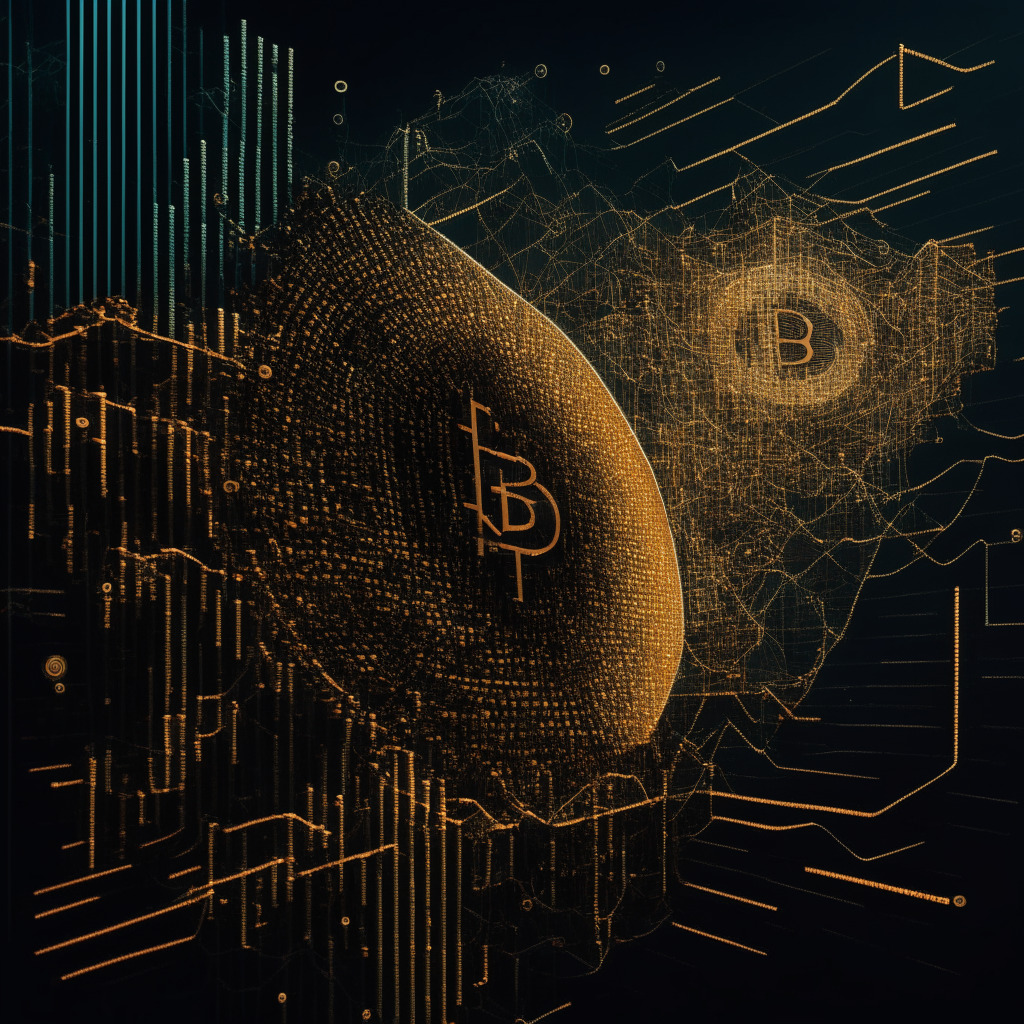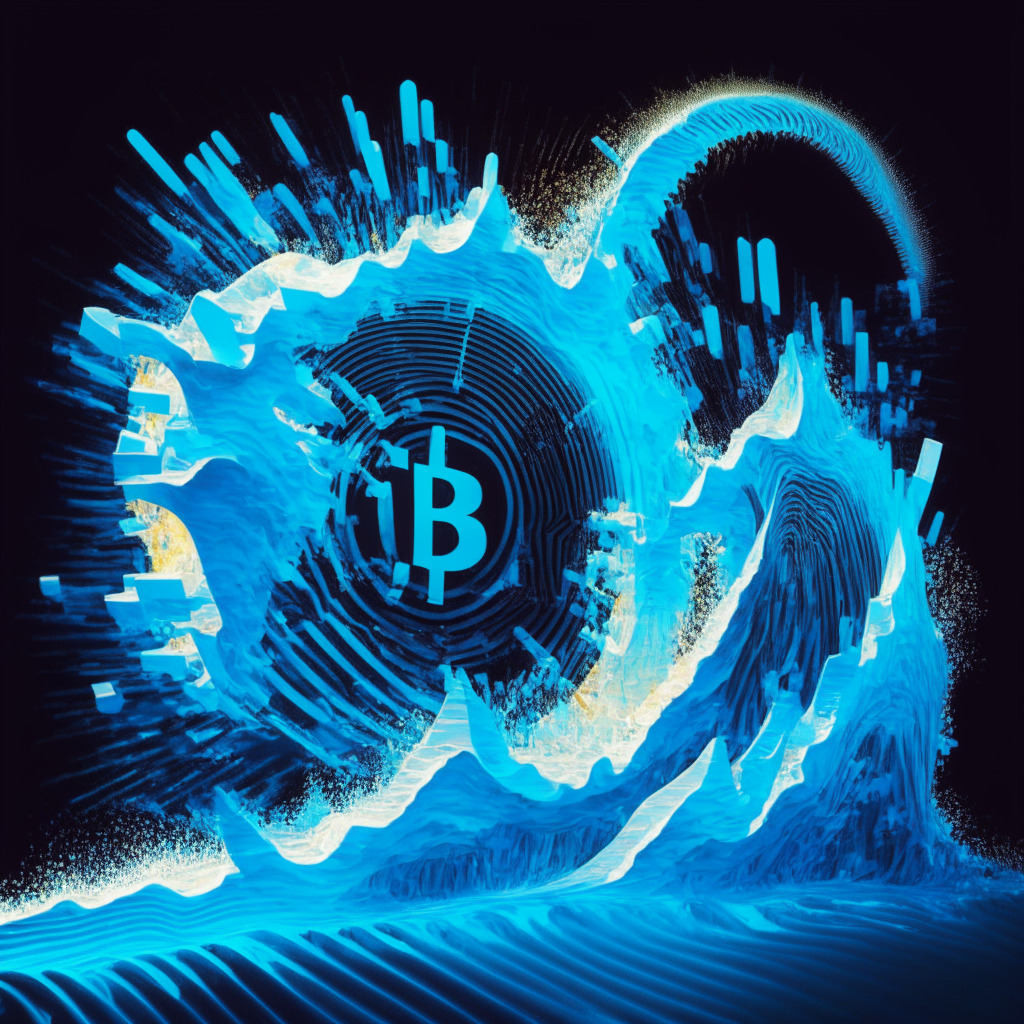BlockFi’s saga continues as the company seeks court authorization to convert ‘trade only’ assets into stablecoins for user withdrawal. This move, supported by the Committee of BlockFi creditors, is part of efforts to return user funds. However, uncertainty remains due to debt and questionable plans. Similarly, Patricia crypto exchange faces skepticism over its debt token, Patricia Token (PTK). These situations highlight tension between trust, regulation, and innovation in the crypto world.
- Kennedy’s Bold Crypto Agenda: An Independent Run for Presidency Powered by Bitcoin
- OK Group’s Rebranding: Power Consolidation or Crypto Evolution?
- The Fall of FTX’s Sam Bankman-Fried: A Cautionary Tale or Web3 Symbol’s Downfall?
- Crucial Crypto Updates: The Bitcoin Slump, Crypto Aid Israel and The Rise of BitVM
- RFK Jr’s Pro-Crypto Presidential Run: Redefining America’s Financial Future and Political Landscape
- Unraveling Ripple’s Future: Implications of CFO’s Sudden Exit on Crypto Landscape
- Unveiling the Crypto Controversy: Accountability Amidst Progress, from Bankman-Fried to Future Prospects
- Blockchain Aid: A Lifeline in Humanitarian Crises or a Cybersecurity Challenge?
- Bitmain’s Struggle but Hive’s Triumph: A Tale of Two Bitcoin ASIC Companies
- Unraveling the AnubisDAO Saga: Accountability Challenges and Transparency Paradoxes in Crypto
Rising Phoenix: XRP’s Resurgence and the Emergence of New Altcoins like WSM
“XRP has seen a 3% gain, boosting its price to $0.529853 and an increase in trading volume to $1.5 billion overnight. Market indications suggest a promising future for XRP, with a 55% price increase since the year’s start. Supporting its optimistic outlook are Ripple’s recent partnerships and steady XRP sales, hinting at stronger performances ahead.”
SUI Network’s Rally Fades: Is it All Downhill or Reprieve in Sight? Plus, Rise of Sonik Coin
“Sui Network’s recovery wanes despite an initial 40% rally. Although struggling with variable market conditions, its layer-1 technology for faster smart contracts sees growth, with active accounts nearly doubling in a week. However, technical structures suggest possible future downturns. Meanwhile, Sonik Coin is gaining momentum, with a promising staking APY and a community-focused vision, distinguishing it in the meme coin market.”
Former FTX CEO’s Regulatory Battle: Technology Access vs Alleged Misuse
Sam Bankman-Fried, former CEO of FTX crypto exchange, faces ongoing legal issues and his case highlights the conundrum of the digital currency world. Regulating sophisticated access to technology, particularly when allegations of misuse arise, proves to be a crucial element in this industry.
Unveiling Patricia Token: A Debt Management Tool or A Scandal in Disguise?
Nigeria’s Patricia crypto exchange introduced its new Patricia Token (PTK), aiming to manage users’ debts, likening it to an IOU system. However, the token’s introduction following a security breach in 2023 has left users concerned and skeptical.
Stacks (STX) Surge: The Ripple Effect of Grayscale’s Triumph and Promising Altcoin Prospects
“Despite a previous decrease, Stacks (STX) leads today’s cryptocurrency market with a recent surge of 16.5%. This is believed to follow Grayscale’s win with the SEC. The future implications of BTC ETF approvals promise further STX gains, while new opportunities for investors like the Launchpad.xyz (LPX) platform continue to emerge, suggesting the ever-evolving nature of the crypto landscape.”
Federal Court Pushes SEC to Reconsider Grayscale’s Bitcoin ETF Bid: A Road to Financial Future?
The federal court has compelled the U.S. SEC to reconsider its denial of Grayscale’s application to convert its Bitcoin Trust into an ETF. This may pave a smoother path for spot Bitcoin ETF adoption, providing investors the chance to delve into cryptocurrency investments minus the need to procure digital assets themselves. However, the potential market instability and the SEC’s reluctance pose remaining challenges.
South Korean Crypto Scandal: A Tale of Ethics, Regulations and Unknown Territories
“South Korean lawmaker, Kim Nam-kuk, retains his seat despite being involved in a $4.5 million crypto scandal. The event raises questions about ethics and integrity in the crypto industry against South Korea’s attempts to form a transparent and accountable crypto trading environment.”
Decoding the PigLido Coin Surge and its Impact on Rising Wall Street Memes Project
The DEX token PigLido witnessed a stunning surge of +30,000% in just 24 hours, attracting attention in the crypto world. However, an audit uncovered potential pitfalls such as blacklisting, a hidden owner, and more, raising suspicions of a scam. Meanwhile, the Wall Street Memes token, backed by a robust community and democratic price point, has raised over $25 million in presale and offers an attractive staking mechanism with a 282% APY. Despite potential scams, the crypto market holds considerable moon-shot potential.
Robinhood’s Tenuous Ties with Crypto: Navigating Uncertainty and Shifting Alliances
Robinhood has severed ties with market-making partner Jump Trading, a significant player in its crypto ventures. This decision stems from the unstable regulatory landscape and changing internal alliances. Moreover, Robinhood’s recent financial records reveal a drop in interest in crypto trading, with trading figures decreasing by 68% relative to the previous year. Despite this data, Robinhood remains one of the largest bitcoin holders.
Genesis Global Capital Bankruptcy: Uncertain Future Amid Creditors’ Resistance and DCG’s Proposal
The futurity of the defunct lender Genesis Global Capital (GGC) is under scrutiny due to concerns raised by creditors over a $1 billion debt. A deal by parent company, Digital Currency Group (DCG), to repay the liabilities has been criticized since it potentially allows DCG to evade future obligations. This controversy underscores the unpredictable, high-stakes nature of the crypto lending realm.
Driving the Future: Jamaica’s CBDC ‘Jam-Dex’ and Its Potential Impact on Public Transport
Jamaica’s public transport sector is expressing interest in the country’s central bank digital currency (CBDC), Jam-Dex. Aldo Antonio, NTAG executive chairman, suggests that Jam-Dex could improve operational efficiency, cut costs, and reduce risks for drivers. However, successful implementation relies on customer adoption and integration with current fintech trends.
Bitcoin Cash Bounces 15% on Grayscale Victory: A Rally Bolstered by Bitcoin or its own Merits?
Following Grayscale’s court victory against the SEC, Bitcoin Cash’s price surged by 15% in 24 hours. The news might prompt further cryptocurrency exchange-traded funds, including a potential BCH ETF, promoting growth in other Bitcoin-related tokens like Bitcoin SV and Stacks.
Digitizing El Salvador: The Landmark Partnership with Google Cloud and its Potential Impacts
El Salvador’s national government partners with Google Cloud in a 7-year initiative to digitize governance, healthcare, and education systems. The wide-scale project aims at streamlining processes and revamping infrastructural resources, fostering a data-driven innovative hub. Skeptics question possible implications for citizen privacy and security. Success could inspire similar digital transformations globally.
EOS Gains Ground in Japan: An Underdog Cryptocurrency’s Resurgence and Its Implications
The EOS Network has received endorsement from Japan’s cryptocurrency authority, granting EOS token rights for trade against the yen on Japan’s regulated cryptocurrency exchanges. EOS Network Foundation CEO, Yves La Rose, views this as a unique opportunity for EOS to grow within a regulated market known for stringent transparency. This development also opens up potential for game tokenization, an untapped sector in Japan.
Jamaican Cab Drivers Embrace Jam-Dex: Relevance, Challenges and Potential Outcomes
Jamaican cab drivers are optimistic about the nation’s Central Bank Digital Currency, “Jam-Dex”, aiming to revolutionize public transportation by eliminating cash and its associated security concerns. Despite a lukewarm public response, proponents believe Jam-Dex could significantly improve daily transactions if successfully adopted by customers.
Crypto Mining & Alternative Energy: Exploring the Environmental Implications of TDF Use
Stronghold Digital Mining, a US-based company, is seeking approval to utilize Tire Derived Fuel (TDF), an unconventional energy source involving shredded tires, for crypto mining. This proposal raises questions on the environmental implications tied to crypto mining and sparks debates about the crypto industry’s path toward sustainability.
GBTC Poised to Erase Bitcoin Price Discount by 2024: Opportunities and Challenges
“The Grayscale Bitcoin Trust (GBTC) may erase its BTC price ‘discount’ by 2024, claims an analysis on the CoinGlass platform. This follows a court victory against U.S regulators that has boosted GBTC performance. However, market conditions, regulatory decisions, and investor behaviour will play major roles in this potential shift in dynamics.”
Nigeria’s Bold AI Leap: Contributing to Global Progress while Navigating Ethical Quandaries
“Nigeria is shaping its National Artificial Intelligence Strategy, seeking global experts to contribute their knowledge. AI, forecasted to contribute $15.7 trillion to the world economy by 2030, could transform Nigeria’s production, services, and economy. However, ethical considerations like data privacy, job displacement, and misuse exist alongside its transformative potential.”
Bitcoin Spot ETF Reconsideration: A Cause for Optimism or Premature Euphoria?
The U.S. Security and Exchange Commission’s reconsideration of Grayscale’s Bitcoin spot ETF has sparked optimism among market participants. Despite this, some remain cautious, warning that the decision doesn’t guarantee Grayscale an ETF listing. Further, the stagnation of digitized asset markets and potential negative effects of bitcoins held at short-term loss could impact faith in Bitcoin. However, the decision suggests possible future favorable decisions on regulatory reforms in the U.S. digital asset markets.
Navigating Regulatory Waters: How Seba’s Expansion Reflects the State of Crypto Banking
Switzerland-based crypto bank, Seba, has received approval-in-principle from Hong Kong’s Securities and Futures Commission. This is an initial step towards gaining a full license for operations with cryptocurrency-related products and traditional securities. Seba’s move correlates with Hong Kong’s new regulatory measures aiming to attract companies into the region.
Bitcoin Bull Run Masterminds: Grayscale’s Legal Triumph and Canaan’s Impressive Q2 Earnings Report
The recent surge in Bitcoin’s price is attributed to Grayscale’s legal victory over the Bitcoin ETF Conversion Lawsuit and Canaan’s impressive Q2 earnings report. This sends a strong bullish signal, potentially driving Bitcoin’s price toward the $28,600 mark.
Crypto Tycoon Sam Bankman-Fried’s Battle with DOJ: A Chess Match with Far-reaching Implications
“The indictment of Sam Bankman-Fried, the force behind cryptocurrency exchange FTX, has raised questions about the legal framework surrounding blockchain technology. Accused of various fraud charges, Bankman-Fried’s defense insists that lawyers approved his contested actions at FTX. The case’s outcome could set important precedents for the crypto industry.”
EOS Network’s Dramatic Turnaround: Nod from JVCEA & Promises of the Japanese Market
EOS Network, a blockchain that garnered $4 billion in its initial coin offering, has been granted white-list approval by Japan’s regulatory body for crypto exchanges. This allows EOS to compete with major cryptocurrencies like Bitcoin and Ethereum on Japan’s regulated crypto exchanges. The approval signifies EOS’s compliance commitment and opens new opportunities for the network in the Japanese market.
EOS Gets Regulatory Approval in Japan: A Milestone for Crypto or a Threat to Anonymity?
EOS, a globally acclaimed cryptocurrency, has gained regulatory approval in Japan, allowing it to be traded against the Japanese yen on regulated exchanges. This marks EOS’s debut on the Japanese exchange BitTrade, highlighting the continued significance of the Asian market to the digital token’s growth. However, while exciting, regulatory acceptance raises questions about possible impacts on anonymity and decentralisation.
Rollercoaster Crypto Future: Bitcoin’s Recent Surge and the Mysteries of Market Dynamics
“Yesterday, Bitcoin rallied 6% following a U.S court ruling criticizing the SEC’s decision to refuse Grayscale’s Bitcoin ETF request as “arbitrary and capricious”. This led to speculation about a potential surge in crypto market capitalization, spurred by the movement of 30,000 Bitcoin to centralized exchanges.”
Grayscale’s Victory Stirs Up Controversy: Doubts Over SEC’s Gensler Heighten
“Cryptocurrency circles discuss Grayscale’s lawsuit and SEC chair Gary Gensler’s role. Congressman Warren Davidson suggests Gensler’s SEC decisions lack stead, as demonstrated by Grayscale’s legal victory. This opens up possibilities for a Bitcoin spot ETF emergence in the US, but the situation remains uncertain.”
China’s Giant Leap: JD.com’s Digital Yuan Revolution for Supply Chain Financing
“JD.com and ICBC are developing a digital yuan using smart contract technology for supply chain financing, enhancing verification, risk identification, and credit guarantees for SMEs. The solution, fostering trust among financial institutions, aims for wider digital yuan acceptance and marks a significant moment in streamlining financial processes.”
AI’s Copyright Conundrum: Balancing Creativity and Tech Advancement in the UK
“The UK government’s proposal to exempt AI from copyright protections for system training using existing literature, music, and art has ignited controversy. Critics assert this potentially undermines creators’ rights and treats arts and cultural production as mere inputs to AI development. The dispute mirrors a broader tension between AI advancement and preserving creative rights, urging for a balanced strategy.”
Binance Expands Crypto-to-Bank Services in Latin America: Opportunities and Challenges
Binance is expanding its reach in Latin America offering a crypto-to-bank account payment scheme, named ‘Send Cash’. This allows users from nine Latin American countries to transfer crypto funds directly into bank accounts, leveraging Binance’s native crypto payment technology platform, Binance Pay. Binance’s initiative aims to overcome challenges linked to the financial exclusion in Latin America.
Swiss SEBA Bank Navigates Hong Kong’s Evolving Crypto Regulatory Landscape
The Swiss-based SEBA Bank, known for its crypto friendliness, has made a significant stride towards offering crypto services in Hong Kong, securing approval-in-principle from the city’s Securities and Futures Commission. This move reflects SEBA’s strategic push to align with Hong Kong’s evolving crypto regulations and to strengthen its regulated presence across the Asia Pacific region.
Navigating the Future of Crypto: As SEC Review Looms, Bitcoin ETFs Hang in the Balance
The U.S. Securities and Exchange Commission (SEC) is closing in on deadlines for deciding on seven new Bitcoin spot exchange-traded fund (ETF) applications. Recent court rulings, including Grayscale Investment’s favorable verdict, has potentially increased the likelihood of successful outcomes for these applicants, though timelines remain unclear. The SEC’s decisions will greatly shape the future trajectory of cryptocurrency regulation.































